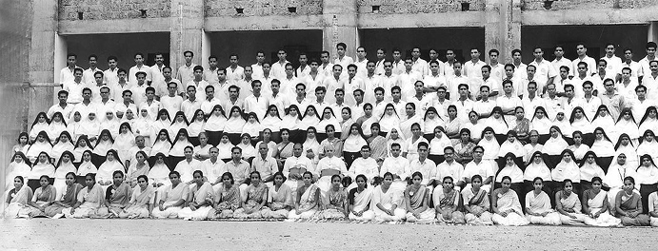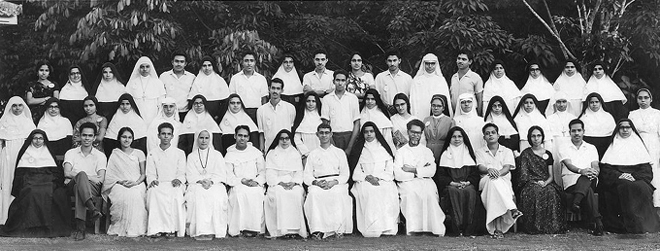

In 1952, 'Kerala Catholic Students League' which lingered in three or four schools and colleges in Kerala was entirely reorganized with new by-laws and programme of activities. In the subsequent years League units were started in all the schools of every diocese of Kerala. ' Catholic' here was retained not in its narrow sense but in its widest so as to reach the benefits of the programme to the whole student community of Kerala.
Study Circles and discussions by groups and among groups formed a main item of the programme on a weekly basis, so as to foster critical and creative thinking, besides social activities of different kinds for fostering love and fellowship among students of different religious affiliations.
In 1954 , Kerala Catholic Teachers Guild was organized for the first time in Kerala and it showed the way for similar guilds in other parts of India such as Bombay, Madras and Delhi. As in KCSL, here also the term 'Catholic' was taken in its widest sense. Units of the Guild were started in all the schools of every diocese throughout Kerala.

Monthly conferences were regular for the Guild. Seminars for teachers were held on an All Kerala basis and subsequently on a regional basis, in which hundreds of teachers participated. The Guild was meant to improve the quality of education in the country. Besides being a boost to the student organization, seminars were means of re-education to the teachers themselves, from the primary to the university level.
In 1961, Theology course for Laity was organized for post-graduates in India. It was a four-year course at the rate of one full month a year during summer holidays. It was the first systematic course in Theology and Bible for the Laity in India and has been instrumental in awakening a theological awareness in Kerala and India. It was a harmonious combination of study, discussion and practice, learning and living, with professors and students staying in one place and participating in every item of the programme and up-to-date 'Gurukulam'. Archbishop Mathew Kavukattu described it as a 'Landmark in the history of education in Kerala.'

In 1973 efforts were made to translate the Bible, from the original into Malayalam, under the auspices of ' Jeevadhara' and St. Joseph Press, Mannanam ,with the cooperation of all the Bible specialists of Kerala. As a result, Malayalam New Testament was brought out in 1978, which is the authentic Malayalam translation at present. Though the translation of the Old Testament was planned out and started, it had to be called off for reasons which would better remain unrevealed.
In 1976, Indian Theological Association (ITA) was founded under the leadership of Rev. Fr. Manalel, for theologians in India. As 'Jeevadhara'
couldnot absorb all theologians of the country on its editorial board, it seemed good to have a fraternity of theologians for the whole of India. It has about two hundred theologians on its membership list. It is the only organization for theologians in India.
The three motives set before the formation of ITA at first were to
ITA meets every year at different places in India for discussion-in-depth of a selected theme. The themes are selected considering (i) the religious diversity of India and (ii)the socio-political situation of the country.
In 1991, a national seminar on 'People's Theology' was organized at Theology Centre on the occasion of the 20th Anniversary of 'Jeevadhara'. It was considered a significant event in the religious history of the country and marked the beginning of a new phase in theological thinking here. The papers presented at the seminar were published in Jeevadhara No. 129 (Vol.XXII, May 1992).
In 1990, Theology Centre started organizing a Model Village around it called 'Swashraya Gramam'. It is based on the fact that human empowerment can maintain justice whatever be the political state of affairs, and uphold thus the democratic ideals.
Efforts at conscientisation and empowerment of the people through neighbourhood communities, seminars and leadership courses have been going on here with some success. But much remains to be done. More of means and staff are required.